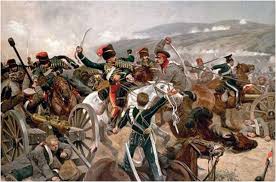The War of Independence: A Struggle for Freedom and Nationhood
3 min read
The term “War of Independence” carries profound historical significance, evoking images of brave men and women fighting for their freedom and sovereignty. Throughout history, many nations have experienced the trials and tribulations of a War of Independence, where they have risen against colonial or imperial powers to assert their right to self-governance and nationhood. In this article, we will explore the concept of a War of Independence, examining its causes, key moments, and the lasting impact on the nations that have embarked on this tumultuous journey.
The Revolt of 1857, often referred to as the Indian Mutiny or the First War of Independence, stands as a watershed moment in the history of colonial India.
Defining a War of Independence
A War of Independence, also known as a struggle for national liberation, is a conflict in which a group or nation seeks to gain independence from a foreign ruling power. Such wars often revolve around asserting sovereignty, establishing self-governance, and securing the right to determine one’s own political and economic destiny.
The Arab League, officially known as the League of Arab States, is a regional organization that plays a crucial role in promoting unity and cooperation among Arab countries.
Causes of a War of Independence
The causes of a War of Independence are multifaceted and may include:
-
Colonial or Imperial Oppression: One of the primary reasons behind a War of Independence is the oppressive rule of a foreign colonial or imperial power. The subjugation of indigenous people, exploitation of resources, and imposition of foreign laws and taxes can ignite a desire for self-determination.
-
Desire for Self-Governance: The yearning for self-governance and the ability to shape one’s own future often drives communities to fight for independence. The imposition of laws and regulations by foreign rulers can be seen as an infringement on a nation’s sovereignty.
-
Economic Exploitation: Economic exploitation, including the extraction of valuable resources without equitable benefits to the native population, can be a driving force behind the call for independence.
Key Moments in a War of Independence
A War of Independence is characterized by several key moments that define the course of the struggle:
-
Declaration of Independence: This pivotal step involves the formal declaration of a nation’s intent to be free and sovereign. It is a powerful symbol of unity and determination.
-
Armed Conflict: Armed resistance against the ruling power is a defining aspect of a War of Independence. Battles, skirmishes, and guerrilla warfare become common methods of asserting independence.
-
Diplomatic Efforts: Diplomacy can play a crucial role in achieving independence. Negotiations, alliances with foreign powers, and diplomatic recognition can contribute to the success of the independence movement.
-
Leadership and Icons: Inspirational leaders and icons often emerge during a War of Independence. Their charisma, vision, and dedication can rally the population and serve as symbols of the nation’s aspirations.
-
Public Support: The backing of the general population is vital for the success of a War of Independence. Mass movements, protests, and civil disobedience campaigns demonstrate the widespread desire for self-governance.
Legacy and Lasting Impact
The aftermath of a successful War of Independence can have a profound impact on a nation and its people. Some key legacies include:
-
Nationhood: The establishment of a sovereign state with its own government, laws, and institutions.
-
National Identity: A sense of national identity, unity, and pride often emerges as a result of the struggle.
-
Cultural Revival: The preservation and revival of native culture, traditions, and languages can be a positive outcome of independence.
-
Economic and Social Changes: New economic and social policies may be implemented to address the injustices of the past and promote the well-being of the population.
-
Geopolitical Consequences: The emergence of a new nation can impact regional and global politics, as alliances and relationships shift in response to the change.
Conclusion
A War of Independence is a complex and arduous journey that has shaped the history of many nations. It is a testament to the enduring human spirit’s desire for freedom and self-determination. While the path to independence is often fraught with hardship and sacrifice, the rewards of nationhood, sovereignty, and national identity are worth the struggle. The stories of these wars continue to inspire and remind us of the indomitable human spirit’s capacity to overcome adversity and tyranny in the pursuit of a brighter future.






